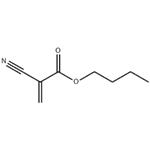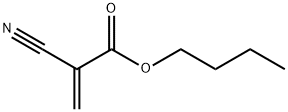- enbucrilate
-

- $0.00 / 1kg
-
2025-04-21
- CAS:6606-65-1
- Min. Order: 1kg
- Purity: 98
- Supply Ability: 1000
- Enbucrilate
-

- $50.00 / 500mg
-
2024-11-19
- CAS:6606-65-1
- Min. Order:
- Purity: 99.27%
- Supply Ability: 10g
- enbucrilate
-

- $6.00 / 1KG
-
2024-03-29
- CAS:6606-65-1
- Min. Order: 1KG
- Purity: 99%
- Supply Ability: g-kg-tons, free sample is available
|
| | enbucrilate Basic information |
| Product Name: | enbucrilate | | Synonyms: | BUTYLCYANOACRYLATE;2-cyano-2-propenoic acid butyl ester;2-Propenoic acid, 2-cyano-, butyl ester;2-propenoic,2-cyano-,butyl ester;enbucrilate;n-Butyl 2-Cyanoacrylate;Enbucrilate 98%min;2-Cyanoacrylic acid butyl ester | | CAS: | 6606-65-1 | | MF: | C8H11NO2 | | MW: | 153.18 | | EINECS: | 229-552-2 | | Product Categories: | acrylate | | Mol File: | 6606-65-1.mol |  |
| | enbucrilate Chemical Properties |
| Boiling point | bp1.8 68° | | density | d20 0.989 | | vapor pressure | 1.3hPa at 20℃ | | refractive index | n20D 1.4424; nD25 1.4410 | | Fp | closed cup: >176°F (>80°C) | | storage temp. | under inert gas (nitrogen or Argon) at 2-8°C | | solubility | Chloroform (Sparingly), Ethyl Acetate (Slightly) | | form | Oil | | color | Colourless | | InChI | InChI=1S/C8H11NO2/c1-3-4-5-11-8(10)7(2)6-9/h2-5H2,1H3 | | InChIKey | JJJFUHOGVZWXNQ-UHFFFAOYSA-N | | SMILES | C(OCCCC)(=O)C(C#N)=C | | LogP | 1.29 at 25℃ and pH7 | | Surface tension | 34.28mN/m at 1g/L and 20℃ | | EPA Substance Registry System | Butyl 2-cyanoacrylate (6606-65-1) |
| | enbucrilate Usage And Synthesis |
| Uses | Enbucrilate is bacteriostatic and its use is usually painless. It is used as an adhesive for lacerations of the skin, and in the treatment of bleeding from vascular structures. | | Definition | ChEBI: Enbucrilate is a nitrile and an alpha,beta-unsaturated monocarboxylic acid. | | Clinical Use | Enbucrilate injection of esophageal varices was first reported by Gotlib and Zimmermann in 1984 and has since been used in the acute treatment of bleeding esophageal varices in a few series, including randomized trials against band ligation for acute bleeding and for eradication of high-risk varices. Enbucrilate is often combined with lipiodol (lipid-soluble ethiodized oil) for injection of bleeding gastrointestinal ulcers; the advantage of this combination is slower polymerization of enbucrilate, with more accurate administration of the glue, but a potential disadvantage is a higher frequency of embolism, several cases of which have been reported. Overall, control of bleeding by using enbucrilate was found to be similar to band ligation, but rebleeding rates were higher. In addition, glue injection was found to be associated with sinus and fistula formation, in one case resulting in catastrophic bleeding. The higher complication rate may be explained by an increased risk of extravascular injection and attendant histotoxic reactions owing to the smaller lumen diameter.
| | in vivo | Enbucrilate offers an important intervention in gastric variceal bleeding which should be further studied in the US. A randomized trial is warranted to compare this intervention to radiological therapy[1]. The tissue adhesive Enbucrilate seems to be a safe, efficient agent to obtain good results in a simple, quick approach in the surgical treatment of symptomatic nephroptosis[2]. |
| | enbucrilate Preparation Products And Raw materials |
|